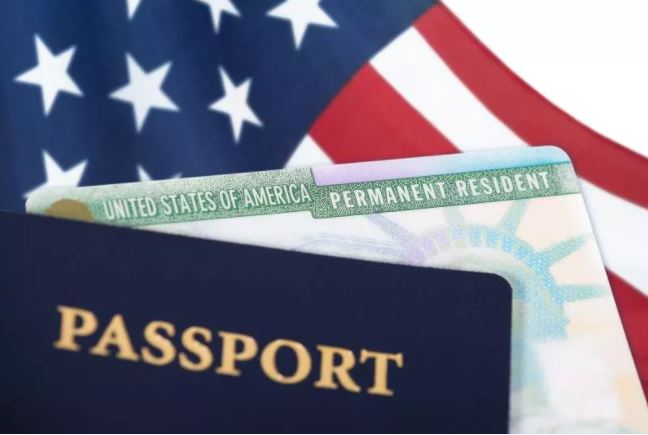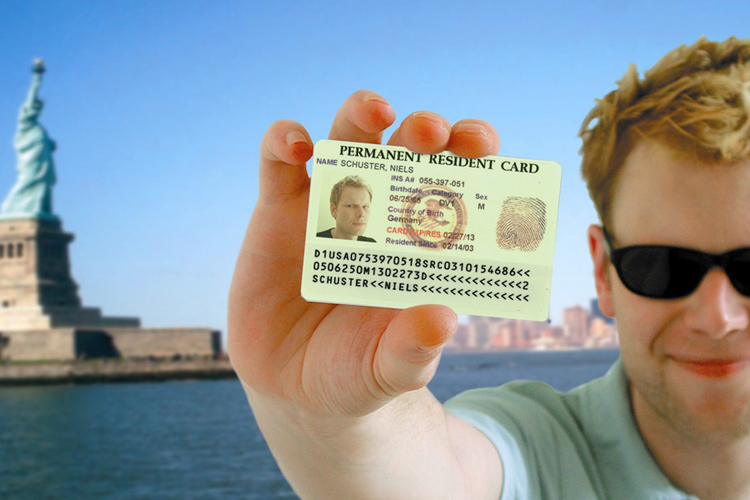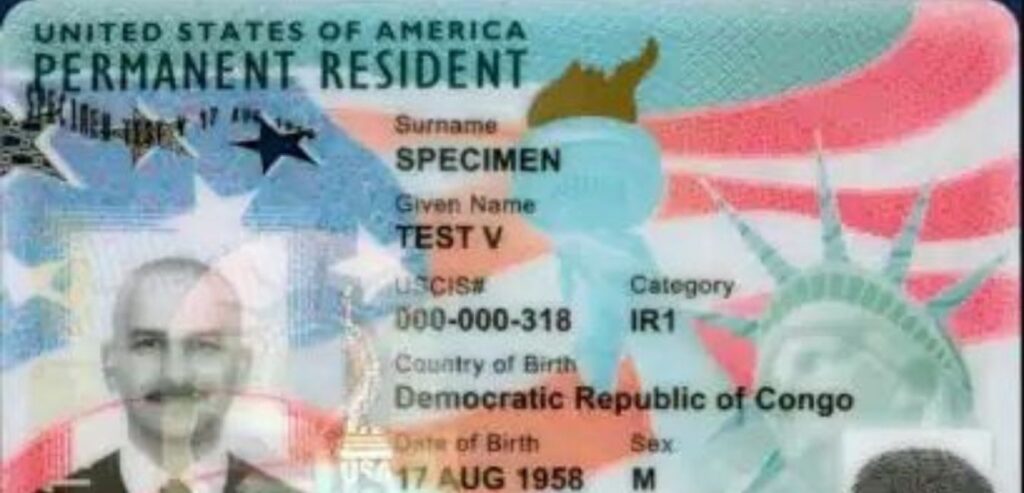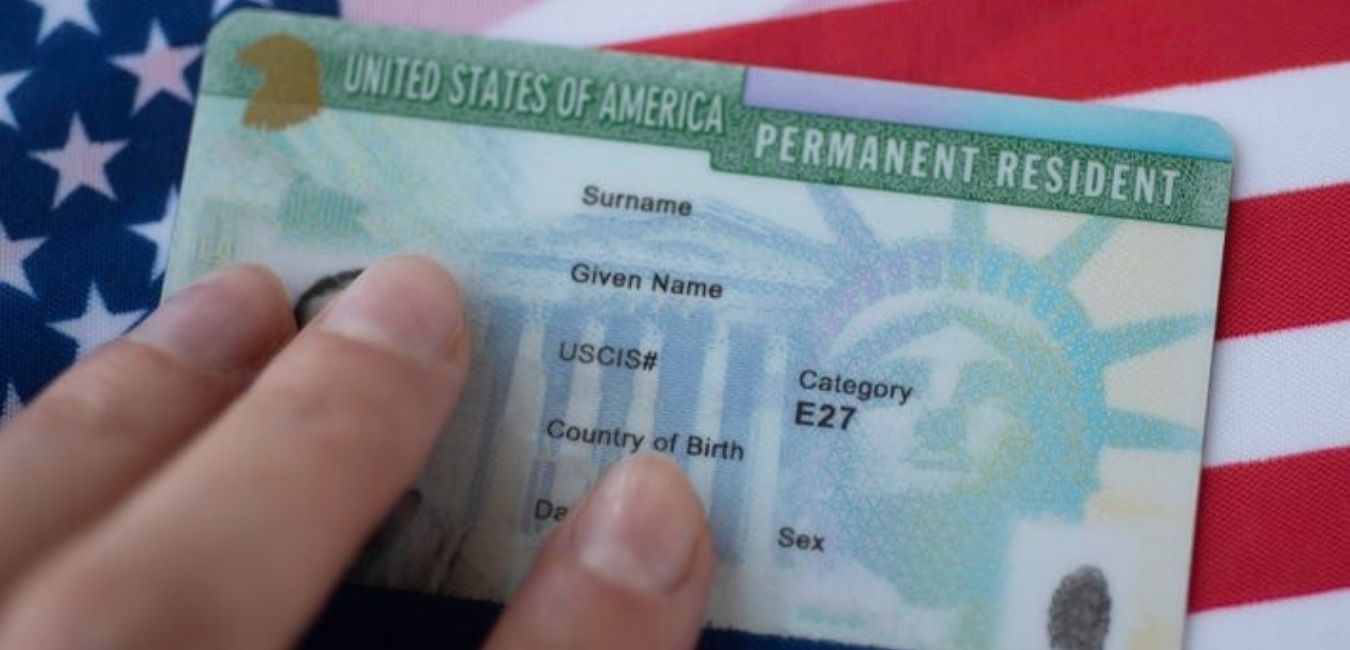U.S. Green Card – Everything to know about the Permanent Residency in the United States, and the U.S. diversity visa lottery requirements and eligibility.
A green card allows a non-U.S. citizen to gain permanent residence in the United States. Many people from outside the United States want a green card because it would allow them to live and work (lawfully) anywhere in the United States and qualify for U.S. citizenship after three or five years.
Every year, the U.S. government issues more than a million green cards. Most are given to family members of U.S. citizens and current green card holders, followed by workers from other countries seeking employment in the United States as the next biggest group of recipients.
The history of the Green Card
The USA has always been an immigration country par excellence. During the 19th and early 20th centuries, immigration to the United States was still unregulated – America was open to immigrants from anywhere in the world in unlimited numbers.
After the American Civil War, the U.S. Supreme Court introduced the first innovations. Later, the “U.S. Immigration and Naturalization Service” (INS for short) was established in 1933.
The foundation for today’s Green Card was laid during World War II: In 1940, the US Congress passed the Alien Registration Act, which established the first concrete rules for immigrating to the United States.
One of the first decisions was to inspect all immigrants entering the United States and issue them an ID card. The document issued was then called “Alien Card” or “Alien Registration Receipt Card” and was actually bright green. This is how the nickname “Green Card” came about.
In 2003, U.S. Immigration and Naturalization Service (INS) was renamed “U.S. Citizenship and Immigration Services.” USCIS still issues the Green Cards today.
After the Green Card was produced in changing colors for a few years (first yellow, then pink, then purple-blue), the US government decided in 2010 to go back to a green design.
The advantages of a Green Card
Owning a US Green Card gives its holder nearly all rights equal to those of a US citizen. These include:
- Unlimited residency in the US
- Unlimited work permit in the USA
- Unlimited and easy entry and exit without a visa or ESTA
- Eligibility for Medicare benefits and other government assistance after 5 years as a Green Card holder
- The right to study at a US university without risk and up to 80% cheaper than without a Green Card
- The possibility of federal loans for students
- Crisis security: Green Card holders are usually not affected by travel embargoes.
- Uncomplicated obtaining of business and commercial licenses
- Family members (spouse and unmarried children under 21) are automatically eligible for a Green Card as well.
- Application for US citizenship is possible after 3 or 5 years as a Green Card holder.
Difference between a U.S Green Card and U.S Citizenship
Both lawful permanent residents (green card holders) and U.S. citizens enjoy many of the same rights, such as the ability to live permanently and work in the United States. However, U.S. citizens enjoy some important benefits that green card holders do not.

Green Card: US immigration made easy
Unlike other US visas, the Green Card is the only sustainable way to move to America. This is due to the lifetime validity of a Lawful Permanent Residence.
Although you can also live and work in the USA for some time with temporary work visas, the expiration date of your US visa poses a permanent risk.
Read Also: 12 Easiest Ways To Get A US Green Card In 2022
In this article, TheVibely has provided answers to some frequently asked questions on the internet about Green Card and the Diversity Visa Lottery such as:
- 1. Green Card Timeline
- 2. Green Card Costs
- 3. Types/Categories of Green Cards
- 4. Who is qualified to apply for the US Green Card Lottery?
- 5. Is my country of birth important for the Green Card Lottery?
- 6. What is the list of countries that qualify for the US Green card lottery?
- 7. What is the list of excluded countries?
- 8. Can people in excluded countries still qualify for Green Card?
- 9. What education or work requirements must I meet?
- 10. Is there an age requirement for the Green Card Lottery?
- 11. What information is asked for in the application?
- 12. How to apply for a Green Card

About Green Card
1. Green Card Timeline
The processing time for a green card is anywhere from 10-38 months, depending on the type of green card you’re applying for and where you’re applying from.
- Applying From Within The United States
For spouses and immediate relatives (parents and minor children) of U.S. citizens applying from within the United States through adjustment of status, the wait is generally relatively short, averaging 13 months (as of April 30, 2021). For spouses of U.S. green card holders, other relatives of U.S. citizens, and employment-based green cards, the wait can be much longer, typically two years or more.
- Applying From Oustide The United States
For spouses and immediate relatives (parents and minor children) of U.S. citizens applying from outside the United States via consular processing, the wait is generally much quicker, between 4 and 6 months (although note the coronavirus pandemic has led to severe delays). All other green card categories are subject to country caps, and wait times vary dramatically.
2. How much does a green card cost?
The government filing fee for a family-based green card is $1,760 for an applicant applying from within the United States and $1,200 for an applicant living outside the United States. Note, this does not include the cost of the medical exam, which varies by provider. Learn more about the costs of a family-based green card.
For other green card categories, check the USCIS website for the cost of your particular form.
3. Types/Categories of Green Cards
There are many categories of green cards. The most common types are:
Family-Based Green Card
Close relatives of U.S. citizens and current green card holders may apply for family-based green cards of their own. Eligible family members include spouses, children, parents, and siblings (as well as the spouses and children of those spouses, adult children, and siblings).
Also included in this category are widows and widowers who were married to a U.S. citizen at the time the citizen died. Like spouses of living U.S. citizens and current green card holders who apply for a marriage-based green card, widows and widowers must prove that their marriage was authentic in order to receive a green card.
Many extended family members — cousins, aunts and uncles, and grandparents — do not qualify. They may apply for a green card only if they, too, have a closer relative who is a U.S. citizen or current green card holder (or qualify for one of the other types of green cards below).
Employment-Based Green Card
Within the employment-based green card category, multiple subcategories of workers can apply for permanent residence. In some cases, their spouses and children may qualify for a green card, as well.
The following table lists the employment-based subcategories and the types of jobs that fall under them:
| Category | Jobs included |
|---|---|
| Priority workers (EB-1) | – Positions in the arts, sciences, education, business, and athletics that require extraordinary* ability – Outstanding professors and researchers – Multinational managers and executives |
| Professionals with advanced degrees and exceptional abilities (EB-2) | – Positions requiring at least a master’s degree – Positions requiring at least a baccalaureate (bachelor’s) degree, plus at least five years of relevant experience – Positions in the sciences, arts, or business requiring exceptional* ability – Positions of national interest |
| Physicians (EB-2 with a special waiver) | – Physicians who agree to work full-time in underserved areas for a specific period and meet other eligibility criteria |
| Skilled, unskilled, and professional workers (EB-3) | – Skilled positions that require a minimum of two years’ training or experience that is not temporary or seasonal – Unskilled positions that require less than two years’ training or experience that is not temporary or seasonal – Professional positions that require at least a baccalaureate (bachelor’s) degree from a U.S. university or college or the equivalent of this degree from a non-U.S. school |
| Special workers (EB-4) | – Media professionalsReligious workers and ministers – Afghanistan and Iraq nationals who have served the U.S. government under certain capacities – Certain other employees, retirees, and their family members |
| Investors (EB-5) | – Non-U.S. nationals who have invested or are investing at least $1 million (or $500,000 in a high-unemployment or rural area) in a new – U.S. business that will create full-time positions for at least 10 workers |
*Extraordinary ability is demonstrated “through sustained national or international acclaim. Your achievements must be recognized in your field through extensive documentation,” according to U.S. Citizenship and Immigration Services (USCIS).
**Exceptional ability refers to “a degree of expertise significantly above that ordinarily encountered” in your field.
Humanitarian Green Cards
- For refugees and asylees
People who fear, or have experienced, persecution in their home country — because of their race, religion, nationality, political opinion, or membership in a particular social group — can seek protection in the United States by applying for a visa from abroad (to come as refugees) or from within the United States (to remain as asylees).
Once they have physically lived in the United States for at least one year since receiving refugee status or asylum, they may apply for a green card. Children and spouses (and in some cases, other family members) of refugees and asylees may also seek protection in the United States under these programs and eventually apply for a green card.
- For human-trafficking victims
Victims of human trafficking who are living in the United States — whether lawfully or unlawfully (in other words, “undocumented”) — may apply for a T visa to stay in the United States for up to four years. As a condition of the T visa, however, they must help to investigate and prosecute perpetrators of human trafficking (unless the victim is under age 18, in which case they need not help with such efforts).
To qualify for a green card, the applicant must have physically lived in the United States for one of the following periods, whichever is shorter:
- Three years since receiving a T visa
- The duration of an investigation or prosecution of human trafficking
They must also meet other eligibility requirements. These include, for instance, demonstrating “good moral character” (meaning they have not committed certain crimes, such as fraud, prostitution, or murder) from the time they received a T visa until they’re approved for a green card. As another example, they must demonstrate to the U.S. government that they would suffer extreme hardship involving severe harm if they were required to leave the United States. (USCIS provides the full list of eligibility criteria.)
Certain family members will also be eligible to apply for their own green cards as long as both those relatives and the victim satisfy all requirements.
- For crime victims
Victims of “substantial physical or mental abuse” who are living in the United States — whether lawfully or unlawfully (in other words, “undocumented”) — may seek protection by applying for a U visa. To obtain a U visa, the victim’s application must be certified by a law enforcement agency. Like recipients of T visas (see above), an applicant for a U visa must also agree to help investigate and prosecute people who commit certain crimes, such as kidnapping, sexual assault, and torture.
To qualify for a green card, however, the applicant will need to fulfill other eligibility requirements, including the following examples:
- They must have physically lived in the United States for at least three years since receiving a U visa.
- They must not have left the United States from the time they applied for a green card until USCIS has approved (or denied) their application.
- They must not have refused to help investigate or prosecute certain crimes from the time they received a U visa until USCIS approves (or denies) their green card application.
The victim’s children, parents, siblings, and spouse will also be eligible to apply for their own green cards as long as both those relatives and the victim satisfy all requirements.
- For abuse victims
Victims of domestic violence (battery or extreme cruelty) may apply for a green card that would allow them to seek relief through the Violence Against Women Act (VAWA). Although this law was created to benefit women, it applies to both women and men, and both parents and children, who are victims of abuse.
An abuse victim may apply for a green card on their own — without the knowledge or permission of their abusive relative, who can include:
- A current or former spouse who is a U.S. citizen or green card holder
- A parent who is a U.S. citizen or green card holder
- A child who is a U.S. citizen
USCIS will not notify the abusive relative of the application in order to keep the victim safe. (Full eligibility requirements are detailed on the USCIS website.)
IMPORTANT: If you or someone you know is experiencing domestic abuse now, contact the National Domestic Violence Hotline right away at 1-800-799-7233 or 1-800-787-3224 (TTY). You’ll be able to talk with someone about available resources, such as shelters, mental health care, and legal assistance. The hotline also provides information about green cards through VAWA.
Longtime-Resident Green Card
Individuals who have physically lived in the United States — lawfully or unlawfully (meaning you were “undocumented”) — since January 1, 1972, may apply for a green card through a special process called “registry.”
To qualify for a green card through the registry, the individual must meet all of the following criteria:
- They entered the United States before January 1, 1972, which they would need to prove by providing an I-94 travel record (officially called the “Form I-94 Arrival/Departure Record”).
- They have not left the United States since arriving.
- They have “good moral character,” meaning they have not committed certain types of crimes, such as fraud, prostitution, or murder (see more info on “Good Moral Character“).
- They’re eligible for U.S. citizenship through naturalization.
- They have not committed crimes that would make them “deportable” (able to be sent back to their home country). Examples of such violations include drug abuse, smuggling, and marriage fraud (marrying a U.S. citizen or green card holder to obtain a marriage-based green card).
- They have not committed crimes that would make them “inadmissible” (meaning they cannot receive a green card). Examples of such violations include entering the United States unlawfully and staying more than six months in the United States with an expired visa.
Diversity Lottery Green Card
Under the U.S. “green card lottery” (officially known as the “Diversity Visa Lottery Program”), the U.S. government every year randomly selects up to 50,000 people from a pool of entries it receives from six geographic regions, such as Africa, Asia, and Oceania. Only people from countries that have had little immigration to the United States in the past — for example, Algeria, Lebanon, and Slovakia — may enter the lottery. (See the full list of countries whose citizens are eligible or ineligible for the 2020 lottery.) The share of green cards distributed to any one country is capped at 7%.
Most lottery applicants live in their home countries at the time they cast their entries, but some already live in the United States under a different type of immigration status.
Other Green Cards
The U.S. government issues many other types of green cards besides the ones discussed above. Some of these include green cards for “special immigrants,” including media professionals, religious workers, Afghanistan and Iraq nationals who have served the U.S. government under certain capacities, and other types of workers who have served in an international organization. Others include green cards for Cuban citizens and American Indians born in Canada.
USCIS provides a list of these other green card types and their eligibility requirements.
If you’re considering applying for a marriage-based green card, Boundless can help. The site makes it easy to complete your application by turning government requirements into simple questions you can answer online. Learn more!

Green Card Lottery
4. Who is qualified to apply for the US Green Card Lottery? (Requirements)
Almost everyone can participate in the Green Card Lottery. There are, however, two criteria that every participant must meet: Country of birth and level of education. You must have proof of these two requirements at the time you win the lottery. Do you qualify to enter the Green Card Lottery?
5. Is my country of birth important for the Green Card Lottery?
Your country of birth plays an important role in the Green Card Lottery because some countries are not allowed to participate. Countries who are excluded usually have an already high rate of immigration to the USA.
Every country which has received more than 50,000 U.S. Green Cards through other legal immigration paths, such as family- or work-based visas over the last five years is automatically excluded from the lottery.
The list of excluded countries, therefore, can change from year to year. It is worth the time to check the list of excluded countries regularly to see if new counties have been added or taken off the list.
Please take note that your nationality plays no role in the Green Card Lottery. Only your country of birth according to current borders is important in deciding if you can participate in the drawing.
6. What are the list of countries that qualify for the US Green card lottery?
The following countries can participate in the 2020 DV Lottery. The list is updated every year in September, so the countries listed below are subject to change.
Asia: Afghanistan, Bahrain, Bhutan, Brunei, Cambodia, Hong Kong, Indonesia, Iran, Iraq, Israel*, Japan, Jordan*, Kuwait, Laos, Lebanon, Malaysia, Maldives, Mongolia, Myanmar (Burma), Nepal, North Korea, Oman, Qatar, Saudi Arabia, Sri Lanka, Syria*, Taiwan, Thailand, Timor-Leste, United Arab Emirates, Yemen, and Macau S.A.R. Hong Kong S.A.R., Macau S.A.R., and Taiwan qualify for the lottery.
*Persons born in the areas administered prior to June 1967 by Israel, Jordan, Syria, and Egypt are chargeable, respectively, to Israel, Jordan, Syria, and Egypt. These persons are eligible for the lottery.
Africa: Algeria, Angola, Benin, Botswana, Burkina Faso, Burundi, Cameroon, Cape Verde, Central African Republic, Chad, Comoros, Congo, the Democratic Republic of the Congo, Côte d’Ivoire, Djibouti, Egypt, Equatorial Guinea, Eritrea, Ethiopia, Gabon, The Gambia, Ghana, Guinea, Guinea-Bissau, Kenya, Lesotho, Liberia, Libya, Madagascar, Malawi, Mali, Mauritania, Mauritius, Morocco, Mozambique, Namibia, Niger, Rwanda, Sao Tome and Principe, Senegal, Seychelles, Sierra Leone, Somalia, South Africa, South Sudan, Sudan, Swaziland, Tanzania, Togo, Tunisia, Uganda, Zambia, and Zimbabwe.
Europe: Albania, Andorra, Armenia, Austria, Azerbaijan, Belarus, Belgium, Bosnia and Herzegovina, Bulgaria, Croatia, Cyprus, Czech Republic, Denmark (including overseas dependents and components), Estonia, Finland, France (including overseas dependents and components), Germany, Georgia, Greece, Hungary, Iceland, Ireland, Italy, Kazakhstan, Kyrgyzstan, Latvia, Lichtenstein, Lithuania, Luxembourg, Macedonia, Malta, Moldova, Monaco, Montenegro, the Netherlands (including overseas dependents and components), Northern Ireland, Norway, Poland Portugal, Russia, Romania, San Marino, Serbia, Slovakia, Slovenia, Spain, Sweden, Switzerland, Tajikistan, Turkey, Turkmenistan, Ukraine, Uzbekistan, Vatican City, and Yugoslavia.
North America: the Bahamas. Canada does not qualify for this year’s diversity lottery.
Oceania: Australia (including overseas dependents and components), Fiji, Kiribati, Marshall Islands, Federated States of Micronesia, Nauru, New Zealand (including overseas dependents and components), Palau, Papua New Guinea, Solomon Islands, Tonga, Tuvalu, Vanuatu, and Western Samoa.
South America, Central America, and the Caribbean: Antigua and Barbuda, Honduras, Argentina, Barbados, Belize, Bolivia, Chile, Costa Rica, Cuba, Dominica, Ecuador, Guatemala, Grenada, Guyana, Nicaragua, Panama, Paraguay, Saint Kitts, and Nevis, Saint Lucia, Saint Vincent, and the Grenadines, Suriname, Trinidad, and Tobago, Uruguay, and Venezuela.
7. What are the list of excluded countries?
Bangladesh, Brazil, Canada, China (including Hong Kong SAR), Colombia, Dominican Republic, El Salvador, Haiti, Honduras, India, Jamaica, Mexico, Nigeria, Pakistan, Philippines, South Korea, United Kingdom (except for Northern Ireland), and its dependent territories, Venezuela and Vietnam.
8. Can people in excluded countries still qualify for Green Card?
There are, however, exceptions! People who were born in an excluded country can still apply to the Green Card Lottery under certain conditions. They are when:
- The spouse of the participant was born in a country that can actively participate;
or
- People born in an excluded country can participate if their parents were only in the country of their birth temporarily for, for example, their studies or work. In this case, both parents must have been born in a country which can participate in the lottery.
In these cases, the participant can take on, so to say, the country of their parents or spouse and enter the country as their “native country” when applying.
9. What education or work requirements must I meet?
You can apply for the Green Card Lottery when …
- … you can prove that you have at least a US high school diploma or an equivalent level of education. This means that participants should have completed at least 12 years of formal primary and secondary schooling.
or
- … you can prove at least two years of work experience within the past five years in a qualified profession. Qualified professions are those that require at least two years of training. Please refer to the database provided by the Department of State to check if your job qualifies.
People who do not fulfill the above requirements cannot, unfortunately, apply for the lottery.
If it is not possible for you to participate in the Green Card Lottery, you can still travel to the USA with an ESTA or apply for a US visa for longer trips across America.
10. Is there an age requirement for the Green Card Lottery?
Principally, there is no age requirement to apply to the lottery, but be aware that effectively people under the age of 16 cannot fill the education requirements.
11. What information is asked for in the application?
Registering for the Green Card Lottery takes place online and is non-binding. If you have ever played with the idea of moving to the USA or have been a long-time, die-hard America fan, then you won’t regret participating in the Green Card Lottery. In case you win, you decide if you want to accept the Green Card or not. Basically, the doors of opportunity are open to you and the Green Card gives you the flexibility to decide if you want to permanently live and work in the USA.
Most importantly, this flexibility is given to you through winning a Green Card. In the application form for the Green Card Lottery, you must give personal details like your first and last name, date of birth, country, and city of birth, passport information, level of education as well as a digital photo. This information is also required for each member of your family, with the exception of their passport details.
- Language skills
Many USA fans ask us about how good their English skills must be to apply for the Green Card Lottery. Principally, participants must not prove any special language skills. Many of our winners have quite the story to tell! Without speaking a word of English, many people have participated in the lottery, won, and successfully emigrated to the USA! We still recommend that you attend English courses at a language school so that you are best prepared when you win the lottery.
- Proof of finances
Furthermore, applicants must not provide proof of their finances at the time that they apply for the Green Card Lottery. This information will first be requested once the Green Card has been won.
12. How to apply for a Green Card
- Inside and outside process: If you are eligible to apply for a Green Card in any of the above-mentioned types or categories, then the first thing you need to check is which process to choose. There is ‘adjustment of status which needs to be done by residing in the US itself and there is ‘consular processing’ which is for candidates who live outside of the US.
- Immigrant petition: Someone has to file an immigrant petition for you which is often called sponsoring. In some cases, you can do it on your own depending on your eligibility.
- Green Card application with USCIS: Once USCIS approves your immigrant petition and there is a visa available in your category, you will need to either file a visa application with the US Department of State or a Green Card application with USCIS. You will need to file Form I-485, including all supporting documents and fees.
- Biometrics appointment: You will then need to attend your biometric appointment to provide your fingerprints, photos, and a signature.
- Interview: USCIS will then review your application and schedule an interview with you.
- Decision: Finally, you will get the result. And once the Green Card is issued, it is valid for 10 years.







